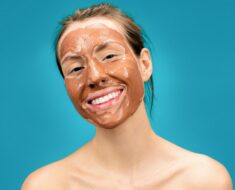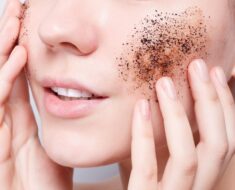Are you starting your day with a steaming cup of coffee, believing it’s the perfect pick-me-up for your skin? Think again.
In this article, we uncover the lesser-known side effects of that beloved cup of Joe on your skin’s health.
Is your morning ritual causing more harm than good?
In a nutshell, excessive coffee consumption can lead to dehydrated and irritated skin.
While we often savor the rich aroma and bold flavor, the caffeine content in coffee may contribute to skin dryness and trigger inflammation.
As we explore the downsides, it becomes evident that moderation is key when it comes to incorporating coffee into your daily routine.
Here coffee ground for skin whitening.
Is coffee bad for skin?
Excessive coffee consumption may impact skin health. Caffeine, a diuretic, can contribute to dehydration, potentially leading to dryness and dullness.

Additionally, it may exacerbate existing skin conditions like acne.
However, moderate coffee intake, rich in antioxidants, can offer some benefits by combating free radicals, potentially reducing signs of aging.
Ultimately, maintaining a balanced lifestyle, staying hydrated, and considering individual sensitivities will contribute to overall skin health.
Here, coffee for skin whitening?
Side effect on coffee on face?
Coffee consumption can have both positive and negative effects on the skin.
On the positive side, the antioxidants in coffee can help neutralize free radicals, potentially reducing signs of aging. Coffee grounds, when used as a scrub, may exfoliate the skin, promoting a smoother complexion.
However, excessive coffee intake can lead to dehydration, possibly causing dryness and contributing to the development of fine lines.
The diuretic effect of caffeine may result in increased urine production, potentially impacting skin hydration.
For some individuals, the acidity in coffee may trigger or worsen skin conditions like acne and rosacea.
Additionally, habitual consumption of highly sugared or creamy coffee beverages can contribute to inflammation, potentially exacerbating skin issues.
Balancing coffee consumption, staying well-hydrated, and being mindful of additives can help mitigate potential adverse effects on the skin.
Here, coffee for skin care.
Disadvantages of coffee on skin
While coffee is often enjoyed for its stimulating effects and potential health benefits when consumed in moderation, there are some potential disadvantages associated with its impact on the skin. Here are a few points to consider:
1. Dehydration:
Coffee is a diuretic, meaning it can increase urine production and potentially lead to dehydration. Dehydrated skin may appear dull, dry, and less elastic.
2. Staining:
Coffee can stain teeth, and if spilled or applied to the skin, it may temporarily stain the skin as well.
3. Potential for Irritation:
The coarse texture of coffee grounds can be abrasive, potentially causing irritation or microtears in the skin. This is particularly relevant if coffee grounds are used as an exfoliating scrub.
4. Acne and Inflammation:
Some people may be sensitive to the oils in coffee, and these oils could contribute to acne or skin inflammation, especially if left on the skin for an extended period.
Here, coffee cream for skin.
5. Caffeine Sensitivity:
For individuals who are sensitive to caffeine, consuming too much coffee may lead to increased heart rate and potential stress, which could indirectly affect the skin.

It’s important to note that individual reactions to coffee can vary, and many people use coffee-based products for skincare without experiencing adverse effects.
If you have specific concerns about how coffee might affect your skin, it’s advisable to consult with a dermatologist or skincare professional.
Additionally, using coffee in moderation and being mindful of its potential impact on hydration and skin sensitivity can help mitigate any negative effects.
Here, coffee ground uses for skin.
Related faq’s
What are 3 disadvantages of coffee?
Excessive coffee consumption can lead to three notable disadvantages. Firstly, it may cause insomnia and disrupt sleep patterns due to its stimulant properties.
Secondly, coffee can contribute to increased anxiety and jitteriness, particularly in sensitive individuals.
Lastly, excessive intake may lead to digestive issues such as acid reflux and stomach discomfort.
Additionally, dependence on caffeine can result in withdrawal symptoms, including headaches and fatigue when consumption is reduced.
Moderation is key to avoiding these potential drawbacks.
Does coffee clear skin?
While some studies suggest that the antioxidants in coffee may have potential benefits for skin health, the overall impact on clearing skin is not conclusive.
Coffee’s antioxidants may help protect against certain skin conditions, but other factors such as hydration and a balanced diet play crucial roles.
Additionally, excessive consumption can dehydrate the skin.
For clear skin, maintaining a healthy lifestyle, proper hydration, and a well-balanced skincare routine are essential, rather than relying solely on coffee.
Is quitting coffee good for your skin?
Quitting coffee can have potential benefits for skin health.
Coffee’s diuretic properties may contribute to dehydration, leading to dull and dry skin. Eliminating coffee can help improve hydration levels, reducing the risk of skin dryness.
Additionally, some individuals may experience a decrease in skin issues like acne or redness after quitting coffee, as its stimulating effects can exacerbate certain skin conditions.
However, the impact varies among individuals, and maintaining overall skin health involves a combination of lifestyle factors.
Can coffee cause skin pigmentation?
Coffee itself is not a direct cause of skin pigmentation.
However, excessive sun exposure combined with caffeine’s diuretic effect may contribute to dehydration, making the skin more susceptible to pigmentation issues like sunspots or hyperpigmentation.
It’s crucial to use sunscreen and practice sun protection to minimize the risk of such pigmentation concerns.
Overall, while coffee alone is not a direct culprit, lifestyle factors including sun exposure can influence skin pigmentation.
Conclusion:
In conclusion, while coffee is undoubtedly a beloved beverage worldwide, it’s essential to be aware of its potential disadvantages on the skin.
The high caffeine content in coffee can lead to dehydration, which may contribute to skin dryness and irritation.
Additionally, excessive consumption may disrupt sleep patterns, leading to tired-looking skin and exacerbating existing skin conditions.






